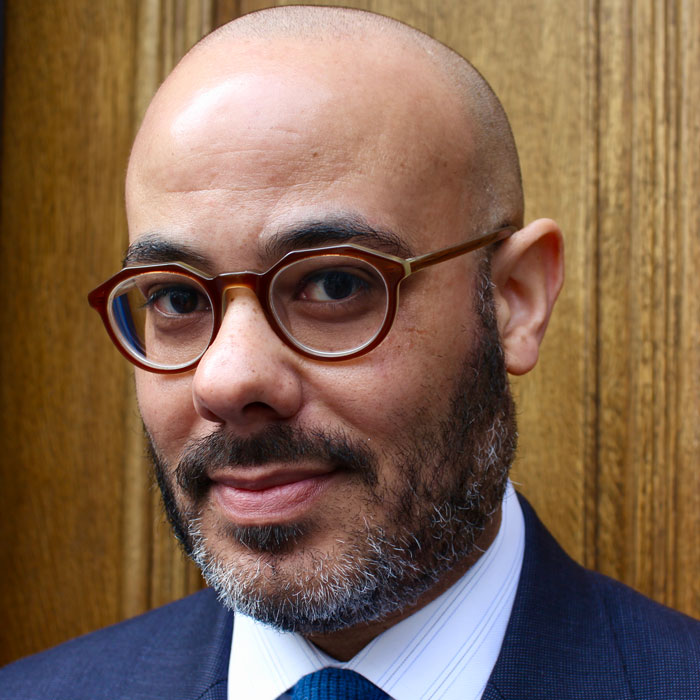
Sara Toth
editor
At the end of its most recent term, the Supreme Court handed down decisions in two cases brought by Students for Fair Admissions — one against Harvard and one against the University of North Carolina — that effectively eliminated the use of affirmative action in college admissions.
It was a decision that many had feared, and others had hoped for, for nearly 40 years, said Justin Driver, and it’s difficult to overstate the decision’s significance.
“It could well set off a series of events that reshape higher education,” said Driver, the Robert R. Slaughter Professor of Law and Counselor to the Dean at Yale Law School.
Driver will deliver the 19th Annual Robert H. Jackson Lecture on the Supreme Court of the United States at 3:30 p.m. today in the Hall of Philosophy, where he’ll discuss the Court’s recent decision, the ramifications it will have, and the precedents it overturned.
“Many people thought that this decision was a foregone conclusion,” Driver said. In an October 2022 guest essay in The New York Times, he offered up ways that preserving affirmative action would be consistent with precedent — an approach he thought would garner a majority on the Court.
“The path I thought would, plausibly, hold some appeal would be to focus on Justice O’Connor’s opinion in Grutter v. Bollinger,” he said. “In 2003, she writes for the Court that it’s been 25 years since we first upheld affirmative action (in Regents of the University of California v. Bakke), and we expect that in another 25 years, that will no longer be necessary.”
Justice Brett Kavenaugh, Driver said, “took that argument quite seriously.”
“He and I differ on how one should count the 25 years. But he agreed that the 25-year sunset provision had some sort of legal significance,” Driver said. “.. So while it would be inaccurate to say that the decision arrived as a surprise, it nevertheless has arrived as a jolt to legal education.
Previously the Harry N. Wyatt Professor of Law at the University of Chicago, Driver teaches and writes in the area of constitutional law, and in 2021 President Joe Biden appointed him to serve on the Presidential Commission on the Supreme Court of the United States. He holds degrees from Brown, Duke and Harvard Law; after graduating, he clerked for then-Judge Merrick Garland, Justice Sandra Day O’Connor and Justice Stephen Breyer.
Issues of education have formed both his professional and personal life; growing up in Southeast Washington, D.C., Driver would make the long trek every day to the Northwest, and to Alice Deal Junior High School. Known as the best middle school in the district, Driver landed a spot there thanks to D.C.’s open enrollment practices, and to the dedication of his father, Terrell Glenn Driver.
“My father departed our house in the wee hours of one morning, drove across the city, and slept fitfully in his car to ensure that he would be among the first parent in the required queue for out-of-district students,” Driver wrote in the acknowledgments of his book, The Schoolhouse Gate: Public Education, the Supreme Court, and the Battle for the American Mind, which is dedicated to his parents.
The Schoolhouse Gate was published in 2018 and named both a Washington Post Notable Book of the Year and an Editors’ Choice of The New York Times Book Review. It also received the Steven S. Goldberg Award for Distinguished Scholarship in Education Law, and was a finalist for the American Bar Association’s Silver Gavel Award and Phi Beta Kappa’s Ralph Waldo Emerson Book Award.
Among the many celebrations of the written word happening during Week Six on Chautauqua’s grounds, that genre of writing — legal opinions and dissents — may be in danger of being overlooked. But there’s value, even a “democratic responsibility for lawyers and judges to make their opinions accessible to people who are steeped in law. … That’s one thing that the best Supreme Court opinions managed to do,” Driver said. It’s also the reason he opted for a trade press in Pantheon Books, rather than an academic or legal publisher, for The Schoolhouse Gate.
His “single favorite opinion in the history of the Supreme Court” when it comes to the craft of writing, is actually from the man for whom the lecture series is named.
“(Jackson) is the finest writer in the history of the Supreme Court,” Driver said. “… The great opinion in question is West Virginia State Board of Education v. Barnette, and it was written in 1943. The question was whether it was permissible to expel students for refusing to salute the American flag and that raises issues, particularly for Jehovah’s Witnesses, who view it as worshiping a graven image and therefore prohibited by Exodus.”
In the middle of World War II, with patriotic sentiment running high, Jackson’s opinion “reconceived” the case from one of freedom of religion, to one of freedom of speech. Effectively, Driver said, the right to speak also means the right to not speak. Jackson concluded in his opinion: “If there is any fixed star in our constitutional constellation, it is that no official, high or petty, can prescribe what shall be orthodox in matters of politics, nationalism, religion, or other matters of opinion, or force citizens to confess by word their faith therein.”
“It is just a beautiful sentence,” Driver said. “It’s one of the few that I can recite by heart. The alliteration, in particular — our constitutional constellation. … In effect, he’s suggesting that it is unbecoming and, indeed, un-American, to require someone to make that pledge.”
On the flip side of that coin, Driver said, is perhaps the “most famous dissent ever written” — Marshall Harlan’s argument in Plessy v. Ferguson that the U.S. Constitution was colorblind, and the country has no class system.
He’ll discuss that as part of his lecture today.




